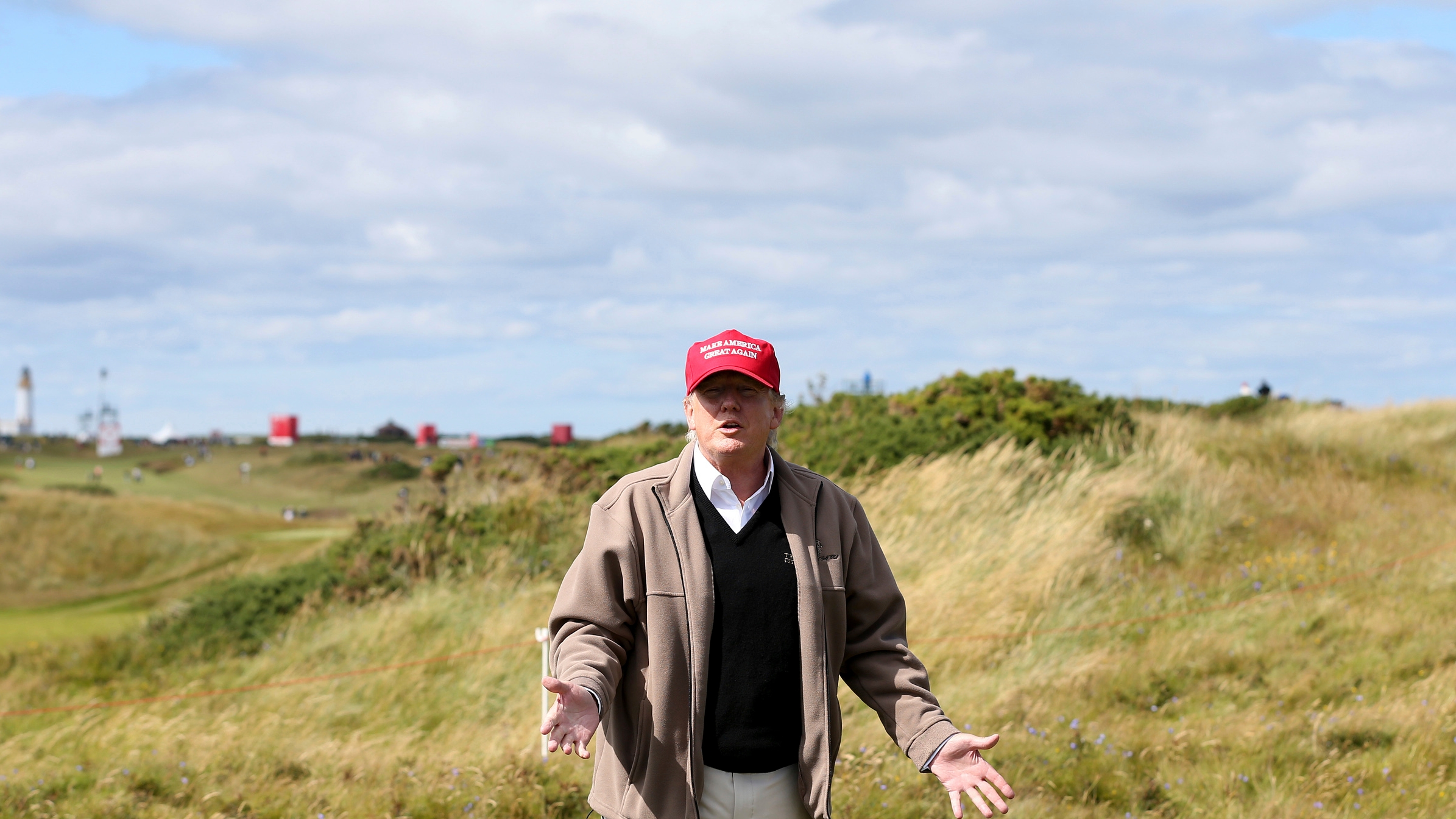Trump won’t leave golf quietly, so the sport will have to make a choice

It’s because both organizations — but especially the PGA — know many of their members still stand firmly behind the outgoing president, even after a mob of his supporters, fueled by his words, laid siege to the Capitol.
The R&A didn’t have as difficult of a decision to make because it didn’t have an upcoming British Open scheduled at what is now known as “Trump Turnberry.” The championship was last played there in 2009, when 59-year-old Tom Watson came within inches of being the oldest man in history to win a major title. It was also the site of Watson’s “Duel in the Sun” with Jack Nicklaus in 1977 and Greg Norman’s first major victory in 1986.
Normally, Turnberry would have been in the championship rota sometime about now, but the R&A backed away from the course after Trump bought it in 2014. The R&A has cited logistical issues getting into and out of the course — which are quite real but have been overcome in the past — for not returning, even though Turnberry is considered one of the United Kingdom’s two or three best championship venues.
“We had no plans to stage any of our championships at Turnberry and will not do so in the foreseeable future,” R&A Chief Executive Martin Slumbers said in a statement Monday. “We will not return until we are convinced that the focus will be on the championship, the players and the course itself. We do not believe that is available in the current circumstances.”
In other words, “we’re not doing business with Donald Trump” — at least right now.
Most American golf entities have had little problem doing business with Trump in the past. The U.S. Golf Association staged the 2017 U.S. Women’s Open at the same Trump course where the PGA was to be played next year. Later in 2017, the PGA Tour held its Senior Players Championship at Trump’s course in Virginia’s Loudoun County. After playing an event at Doral for 45 years, the tour left the Miami property several years after Trump acquired it, not because it objected to Trump’s politics but because it needed corporate sponsorship. That event moved to Mexico.
It’s unlikely the PGA of America would have moved next year’s PGA if not for last week’s events at the Capitol. Talk to people in the golf world who have dealt with Trump, and they’ll tell you that losing the PGA Championship and knowing he isn’t going to get a British Open probably make him almost as angry as losing the election.
Since this week’s announcements, the silence coming from tour players has been deafening. Jack Nicklaus, an outspoken supporter of Trump before the election, has been silent, as has Tiger Woods — golf’s greatest players.
It is not a coincidence that White coaches — such as Kerr, Calipari, the San Antonio Spurs’ Gregg Popovich, Duke’s Mike Krzyzewski and Belichick — have taken stances against Trump. They have spent their lives working with Black colleagues. Golfers rarely do.
The PGA of America is made up of 28,000 club pros, men and women who teach the sport and sell golf equipment out of pro shops. The PGA Tour, with which it’s often confused, is made up of the sport’s elite players, good enough to play the game for a living.
The two groups were a single entity before those playing the tour broke away and formed their own organization in 1968. That move came only seven years after the PGA of America removed the “Caucasians-only” clause from its membership bylaws.
A mere 98 years after Abraham Lincoln issued the Emancipation Proclamation, the country’s primary golf organization got around to removing the words that banned minorities. Sixty years later, the lateness of that moment is still significant.
According to the PGA of America, 167 of its 28,000 club pros — less than 1 percent — are Black. According to the tour, three full-fledged tour members are Black: Woods, Harold Varner III and Cameron Champ. And if those White tour players and club pros voted in November, they most assuredly did so for Trump.
In a very real sense, golf has been Trump’s escape hatch from the realities of his crumbling political life, both when he plays the game and in the support he continues to receive from many who play at the highest level.
But Trump’s future in golf is now, at the least, murky. Regardless of what he does after he leaves office, he will remain a polarizing figure. Sponsors aren’t likely to rush to put their names on events associated with Trump. No golf organization is going to want to face the almost certain protests that would occur at a Trump golf course during a major event.
Trump has spent massive amounts of money acquiring and building golf courses — he now owns 17 of them. He made it clear that his dream was to host as many major events at as many of his courses as possible.
Now, even though many in the golf world are still Trump supporters, he is radioactive. Chances are he will continue to push golf’s leadership to let him back into their world. They are also likely to be pushed in that direction by many of their members — club pros and tour pros.
Trump will never go away quietly. And if there is one sport where he might be welcome again someday, it is, without a doubt, golf.






